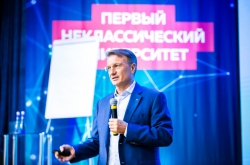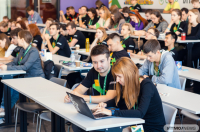The discussion brought together leading experts from government, business, science and education. The participants were: Xavier Bettel, Prime Minister of Luxembourg; Liam Maxwell, UK’s National Technology Adviser; Jack Ma, founder of Alibaba Group; Herman Gref, CEO and Chairman of the Board at Sberbank; Jacqueline Poh, CEO of GovTech Singapore; Michio Kaku, futurologist and professor at The City College of New York; and Noah Raford, COO at Dubai Future Foundation.
The plenary discussion focused on the role of state and corporate management during a transition to a digital economy. Opening the discussion, Prime Minister Dmitry Medvedev noted that today, a digital economy is an integral part of society and becomes such without government influence. Technologies are rapidly changing the public conscience, companies’ business models and create new markets. They also make governments change, transforming their approach to management and to working with businesses. As the PM noted, Russia has already taken the first steps on its way to creating a digital economy.

Dmitry Medvedev. Credit: forinnovations2017.tassphoto.com
“We have recently started the “Digital Economy” program and established a management system for it. A dialogue between the state and businesses has been initiated in several areas: this includes, for instance, human resources, education, creation of research competencies, information infrastructure and security. For each of these areas, working groups have been formed,” – he said.
He also added that, in the conditions where many states face challenges of a new economic system, Russia is able to establish a digital sovereignty – though it does not intend to turn inward and create a “digital kolkhoz”.
“The Russian market’s capacity is limited; we intend to promote our products on the global market and we want to cooperate with international partners. It is important to create an atmosphere of trust – even today, when that’s not always easy. We remain open and the dialogue will continue,” – he explained.

Xavier Bettel. Credit: forinnovations2017.tassphoto.com
Xavier Bettel, Prime Minister of Luxembourg, also spoke about the principles of maximum transparency in the conditions of a new economy. Today, his country is at the forefront of digitalization in the European Union.
“We are consciously trying not to create digital ministries; I took this upon myself, as it is much easier for me to convince my colleagues to solve these issues directly. It’s important to keep in mind that the mentality of bureaucracy is the enemy of digitalization. To take it out of the equation, we started a digital initiative on which we work directly with businesses and let entrepreneurs understand that we are not their enemies. We are open and ready to learn from our partners,” – he said.
Another secret to Luxembourg’s success in the creation of a digital economy, Bettel says, is its exceptional approach to education. He notes that, even in times of crises, the country had been able to save up some of its resources to invest into education and research.
Digital education
But what should education be like in the era of digital economy? It is doubtful that in the future our children will need to possess the same knowledge that we’d learned as kids, believes former school teacher and translator, now billionaire and the richest man in China – Jack Ma. They will also not have our concerns about the millions of jobs lost to technology. Instead, they can become leaders on new markets, he explains.

Jack Ma. Credit: forinnovations2017.tassphoto.com
“If we teach our children what we know, they will likely have no use for it in their new world. Old knowledge will probably be useless. We should realize and accept that, in the future, machines will be more intelligent than us. Humans used to work like machines; now that machines have liberated us from routine labor, we can truly feel like humans. I am optimistic about the future, and I think that the new generation will be able to find the answers to the challenges posed before them by the new technological revolution,” – shared Ma.
Popularizer of science, futurologist and scientist Michio Kaku concurred with his point. In the future, when massive amounts of data would be stored on highly portable mediums, students will probably not need to remember everything they’ve been told by their professors. Because of this, new competencies will gain priority. This global transformation will affect more than just education, and those who are becoming involved in this new paradigm today will have the chance to become the new Jack Ma or Jeff Bezos.
“Even today, the economy is going digital. Capitalism is based on supply and demand – a seemingly just system, yet you don’t really know what mark-up the vendor really sets. In the future economy, everyone will be able to know the true price of things, which leads us to the ideal supply-and-demand system. Undoubtedly, this will be damaging to some – particularly the intermediaries and go-betweens. But remember – back in the day, what made Amazon big was that it replaced intermediaries with digital technologies. If you want to stay in the market, take any field, observe the players and note the things that still cause people trouble. Then, try to solve these things with technology. Once you have done this, you’ll be the new Jeff Bezos,” – said Kaku.

Credit: forinnovations2017.tassphoto.com
The Open Innovations forum is held in Moscow for the sixth time, organized by the Russian Government. According to the organizers, the event brought together more than 17 thousand participants and 785 speakers, including top representatives of the governments of Russia and other countries, founders and executives of major companies and investment funds, as well as young technological entrepreneurs. This year, the forum’s topic is “Digital Economy. Challenges of Global Transformation”.
The forum takes place over three days, each with its own agenda. The key theme of the first day was the digital transformation of traditional companies and industries, and the revolution in management technologies. The second day focused on the changes in state management due to global digitalization. The third day will feature a discussion of the social aspects of digital economy integration.






